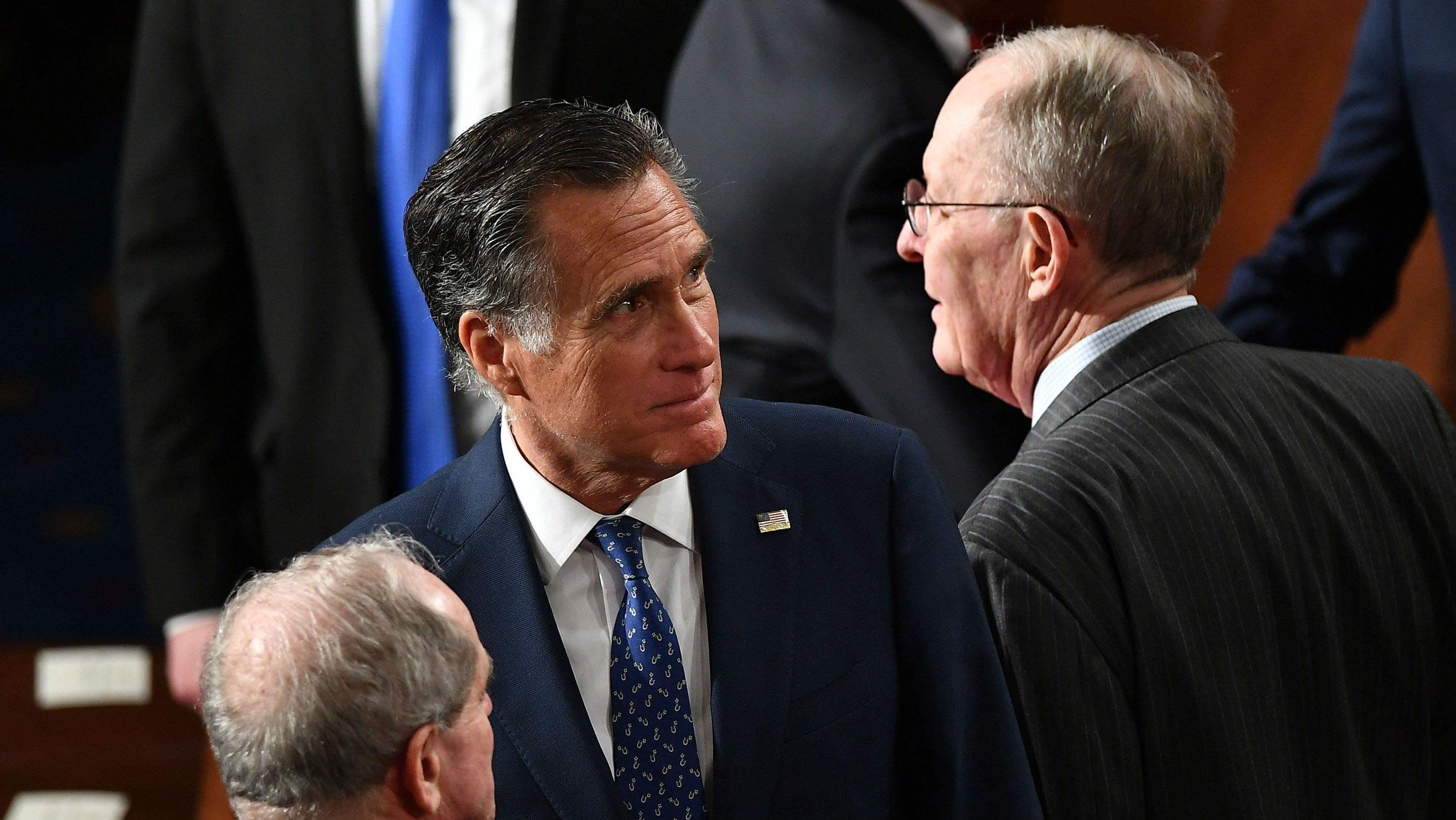Donald Trump acquitted: why Mitt Romney rebelled
Longstanding critic spoke of God and his own place in history

A free daily email with the biggest news stories of the day – and the best features from TheWeek.com
You are now subscribed
Your newsletter sign-up was successful
Mitt Romney of Utah was the only Republican senator to cross the aisle and vote to convict Donald Trump, as the US president was cleared overnight in his impeachment trial.
In what CNN describes as a “stirring and emotional speech on the Senate floor”, Romney broke with his party and voted to convict Trump on abuse of power.
In doing so, he became the only senator in history to vote to remove a president from his own party in an impeachment trial.
The Week
Escape your echo chamber. Get the facts behind the news, plus analysis from multiple perspectives.

Sign up for The Week's Free Newsletters
From our morning news briefing to a weekly Good News Newsletter, get the best of The Week delivered directly to your inbox.
From our morning news briefing to a weekly Good News Newsletter, get the best of The Week delivered directly to your inbox.
“Wow,” tweeted Ben Riley-Smith, the US editor of The Daily Telegraph. “Just been in Senate as Mitt Romney delivered an absolutely scathing rebuke of Trump.”
He added that Romney “held hands clasped as if in prayer” during a speech “heavy with history and God”.
Romney said it was his faith that guided his decision to rebel against his party. “I am a profoundly religious person,” he said. “I take an oath before God as enormously consequential.”
He also spoke of his place in history, adding: “My promise before God to apply impartial justice required that I put my personal feelings and biases aside.
A free daily email with the biggest news stories of the day – and the best features from TheWeek.com
“Were I to ignore the evidence that has been presented, and disregard what I believe my oath and the Constitution demands of me for the sake of a partisan end, it would, I fear, expose my character to history's rebuke and the censure of my own conscience.”
–––––––––––––––––––––––––––––––For a round-up of the most important stories from around the world - and a concise, refreshing and balanced take on the week’s news agenda - try The Week magazine. Start your trial subscription today –––––––––––––––––––––––––––––––
The Atlantic reminds us that Romney “famously opposed Trump’s candidacy in 2016, and while the rest of his party has fallen in line since then, he has remained stubbornly independent”.
It says Romney found the case presented by the president’s defence team “unpersuasive” and was “unmoved” by the Trump attorney Alan Dershowitz’s arguments.
Trump’s eldest son, Donald Trump Jnr, had his own theory for the rebellion. “Mitt Romney is forever bitter that he will never be POTUS,” he tweeted. “He was too weak to beat the Democrats then so he's joining them now.”
The president himself has held a grudge against Romney since 2016, when the senator denounced him as a “phony”, a “fraud” and warned of “trickle-down racism” if he became president.
“In our increasingly predictable partisan world”, Romney’s rebellion “was as close to a surprise as Washington is still capable of”, writes Susan B. Glasser in the New Yorker.
But she says the “wrenching truth” about Romney’s vote is that it “did not matter to the final, preordained outcome”.
In the end, says Glasser, Trump’s acquittal “makes him the president he always wanted to be: inescapable and utterly unaccountable”.
-
 The ‘ravenous’ demand for Cornish minerals
The ‘ravenous’ demand for Cornish mineralsUnder the Radar Growing need for critical minerals to power tech has intensified ‘appetite’ for lithium, which could be a ‘huge boon’ for local economy
-
 Why are election experts taking Trump’s midterm threats seriously?
Why are election experts taking Trump’s midterm threats seriously?IN THE SPOTLIGHT As the president muses about polling place deployments and a centralized electoral system aimed at one-party control, lawmakers are taking this administration at its word
-
 ‘Restaurateurs have become millionaires’
‘Restaurateurs have become millionaires’Instant Opinion Opinion, comment and editorials of the day
-
 Why are election experts taking Trump’s midterm threats seriously?
Why are election experts taking Trump’s midterm threats seriously?IN THE SPOTLIGHT As the president muses about polling place deployments and a centralized electoral system aimed at one-party control, lawmakers are taking this administration at its word
-
 ‘Restaurateurs have become millionaires’
‘Restaurateurs have become millionaires’Instant Opinion Opinion, comment and editorials of the day
-
 Should the EU and UK join Trump’s board of peace?
Should the EU and UK join Trump’s board of peace?Today's Big Question After rushing to praise the initiative European leaders are now alarmed
-
 Witkoff and Kushner tackle Ukraine, Iran in Geneva
Witkoff and Kushner tackle Ukraine, Iran in GenevaSpeed Read Steve Witkoff and Jared Kushner held negotiations aimed at securing a nuclear deal with Iran and an end to Russia’s war in Ukraine
-
 Kurt Olsen: Trump’s ‘Stop the Steal’ lawyer playing a major White House role
Kurt Olsen: Trump’s ‘Stop the Steal’ lawyer playing a major White House roleIn the Spotlight Olsen reportedly has access to significant US intelligence
-
 Trump’s EPA kills legal basis for federal climate policy
Trump’s EPA kills legal basis for federal climate policySpeed Read The government’s authority to regulate several planet-warming pollutants has been repealed
-
 House votes to end Trump’s Canada tariffs
House votes to end Trump’s Canada tariffsSpeed Read Six Republicans joined with Democrats to repeal the president’s tariffs
-
 Bondi, Democrats clash over Epstein in hearing
Bondi, Democrats clash over Epstein in hearingSpeed Read Attorney General Pam Bondi ignored survivors of convicted sex offender Jeffrey Epstein and demanded that Democrats apologize to Trump